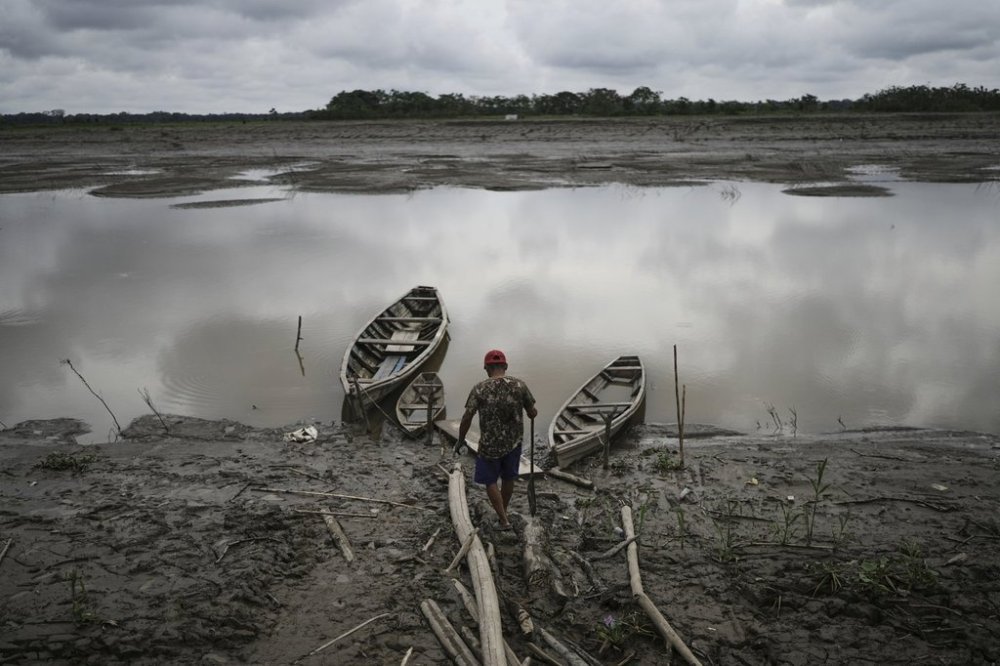World
Study Reveals Amazon Rainforest Vital for Human Health on Indigenous Lands

Research published in the journal *Communications Earth & Environment* has revealed that well-preserved areas of the Amazon rainforest, particularly those on Indigenous lands, significantly contribute to reducing the incidence of various diseases among local populations. The study highlights a critical link between the health of the forest and the well-being of Indigenous communities, reinforcing long-held beliefs by these groups about the interconnectedness of human health and the environment.
As preparations intensify for the upcoming United Nations climate summit scheduled for November 2023 in Belem, Brazil, the study’s findings underscore the importance of Indigenous rights in climate discussions. Belem, known as the gateway to the Amazon, will host numerous delegates and activists who are expected to advocate for the role of Indigenous communities in conservation and climate action.
Francisco Hernández Cayetano, president of the Federation of Ticuna and Yagua Communities of the Lower Amazon (FECOTYBA), emphasized the traditional Indigenous perspective that sees a fundamental relationship between human health and the natural environment. “If each state does not guarantee the rights and territories of Indigenous peoples, we would inevitably be harming their health, their lives, and the ecosystem itself,” he stated.
The study, led by researchers at the International Union for Conservation of Nature, examined data on forest quality, legal recognition of Indigenous territories, and disease prevalence in countries bordering the Amazon. Senior program coordinator Paula Prist noted that various health issues, including respiratory diseases caused by air pollution and zoonotic diseases like malaria, are exacerbated by environmental degradation.
The research employed rigorous methods to analyze complex interrelations between forest preservation and health outcomes, attracting praise from experts like Kristie Ebi, a health and climate scientist at the University of Washington. Ebi acknowledged the study’s contribution to understanding how Indigenous stewardship of lands can influence public health.
Despite the encouraging findings, some experts urge caution regarding the precision of the study. Magdalena Hurtado, an anthropology and global health professor at Arizona State University, raised concerns about the significance of the threshold that claims Indigenous territories only protect health when forest cover exceeds 40%. She questioned the rationale behind this specific percentage, suggesting it could lead to misleading conclusions.
Nevertheless, Hurtado recognized the study as an important foundation for future research. “They are actually doing something quite beautiful,” she said, referring to the connection established between legal recognition of Indigenous lands and health outcomes.
The implications of these findings reach far beyond academic circles. For policymakers attending the climate summit, the study serves as a reminder of the urgent need to uphold Indigenous rights as a means to protect both human health and the environment. Hernández highlighted that visibility of Indigenous knowledge within scientific frameworks can influence global policy decisions.
In addition to examining the relationship between forest cover and health, the study also reinforces the need for broader approaches to land use. Prist emphasized that while the preservation of landscapes is crucial for health, it is also essential to consider the land requirements for agriculture and livestock production. “The world needs landscapes that provide economic services, but also services that protect people’s health,” she stated.
The collaborative effort behind the research, which involved scientists from various nations, aimed to make critical information about the Amazon publicly accessible. Julia Barreto, an ecologist and data scientist involved in the study, expressed the significance of recognizing the Amazon’s global importance, noting, “It is not only one country, and the whole world is depending on it somehow.”
As the international community prepares to convene in Brazil, the findings of this study may serve as a pivotal factor in discussions about environmental policy and the protection of Indigenous rights, emphasizing the role of healthy ecosystems in safeguarding human health.
-

 Science2 months ago
Science2 months agoToyoake City Proposes Daily Two-Hour Smartphone Use Limit
-

 Health2 months ago
Health2 months agoB.C. Review Reveals Urgent Need for Rare-Disease Drug Reforms
-

 Top Stories2 months ago
Top Stories2 months agoPedestrian Fatally Injured in Esquimalt Collision on August 14
-

 Technology2 months ago
Technology2 months agoDark Adventure Game “Bye Sweet Carole” Set for October Release
-

 World2 months ago
World2 months agoJimmy Lai’s Defense Challenges Charges Under National Security Law
-

 Technology2 months ago
Technology2 months agoKonami Revives Iconic Metal Gear Solid Delta Ahead of Release
-

 Technology2 months ago
Technology2 months agoSnapmaker U1 Color 3D Printer Redefines Speed and Sustainability
-

 Technology2 months ago
Technology2 months agoAION Folding Knife: Redefining EDC Design with Premium Materials
-

 Technology2 months ago
Technology2 months agoSolve Today’s Wordle Challenge: Hints and Answer for August 19
-

 Business2 months ago
Business2 months agoGordon Murray Automotive Unveils S1 LM and Le Mans GTR at Monterey
-

 Lifestyle2 months ago
Lifestyle2 months agoVictoria’s Pop-Up Shop Shines Light on B.C.’s Wolf Cull
-

 Technology2 months ago
Technology2 months agoApple Expands Self-Service Repair Program to Canada









